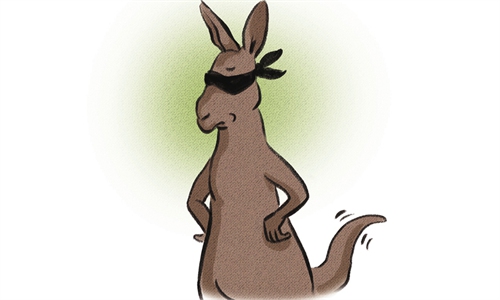
Imported beef is sold in a supermarket in Shanghai on August 20, 2020. Photo: VCG
China issued more import suspension orders on beef and timber from Australia on Monday after quality hazards were spotted, and bilateral trade is now likely to shrink further. Chinese analysts following China-Australia trade said the new suspensions reflect the authorities' responsible attitude to consumers and may cause Australian exports to China to fall another 1 percent.
On Monday, the General Administration of Customs (GAC) announced that China had suspended imports of timber from the Australian states of Tasmania and South Australia as of December 3, and it also suspended imports from Australian beef supplier Meramist Pty Ltd, the sixth supplier to face such a move in Australia this year.
The timber shipments were suspended after customs inspectors identified non-indigenous insects in imported logs. Banned pests were found among logs from the states of Queensland and Victoria in October and November.
The GAC said that quarantine measures relating to Australian timber will be strengthened and adjusted to guard against similar instances.
Song Wei, an associate research fellow at the Chinese Academy of International Trade and Economic Cooperation, said the fact that Australia is sending China hazardous goods, including but not limited to timber, showed that the country's industries have been negatively affected by the pandemic and quality controls are in a lax state.
Yu Lei, the chief research fellow at the Research Center for Pacific Island Countries at Liaocheng University, told the Global Times on Tuesday that every country will take such action if hazards are discovered.
The blocks on imports are expected to take 1 percent off Australia's total exports to China.
Amid frayed bilateral relations, a large number of Australian exports have run into problems in China, including beef, lobster, coal, barley and wine.
Bilateral ties have entered a downward spiral due to the relentless hostile approach of the Australian side, starting from calling for a weapons-inspector-style probe into the COVID-19's origin to China's internal issues over Hong Kong, and the recent demand for an apology from China over an illustration depicting its own soldiers' bloody killings in Afghanistan.
With iron ore being the sole exception, almost all other Australian exports to China have been affected, and the scope of products is likely to further grow, an observer following China-Australia relations told the Global Times on Tuesday.
The administration of Prime Minister Scott Morrison, which is taking an extremely unfriendly attitude toward China, is to blame for the situation, the observer said. "Unless it promises to take practical actions to mend ties, the ties will further sour."
According to statistics from Trend Economy, Australia exported timber to China worth about $1.08 billion in 2019, or 66.4 percent of total timber exports.
China's imports of Australian beef have seen a steep decline, from 14,000 tons in September to 11,932 tons in October, down 14 percent, according to industry portal Beef to China.
Amid soured political ties, China's trade with Australia declined further in November, and it fell 0.9 percent year-on-year in the first 11 months of the year, GAC data showed on Monday.
Total bilateral trade stood at $153.15 billion from January to November, with China's imports from Australia down by 4.9 percent, while exports surged by 9.4 percent, rebutting calls by some in Australia to boycott Chinese products.
However, Yu said that Australia is less likely to make a major shift in its attitude toward China, as its standing as the US' deputy sheriff won't change.




